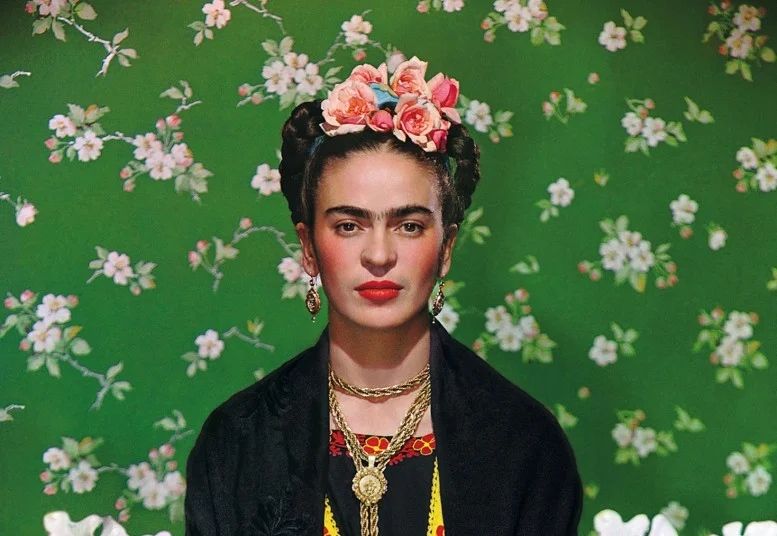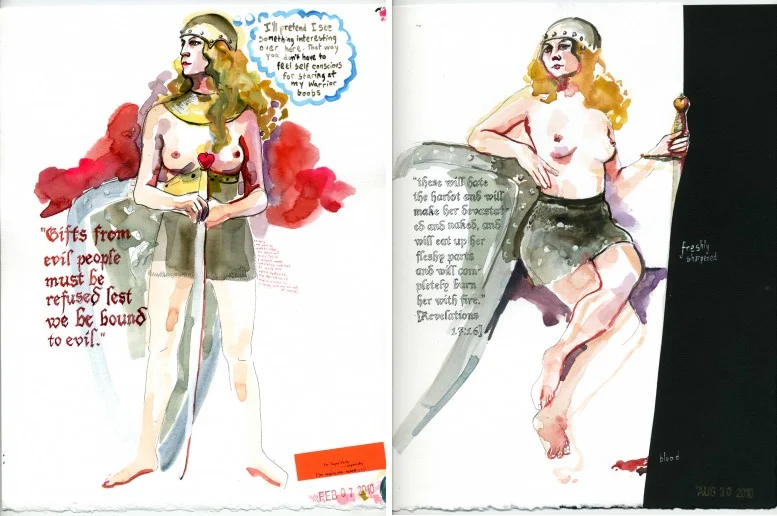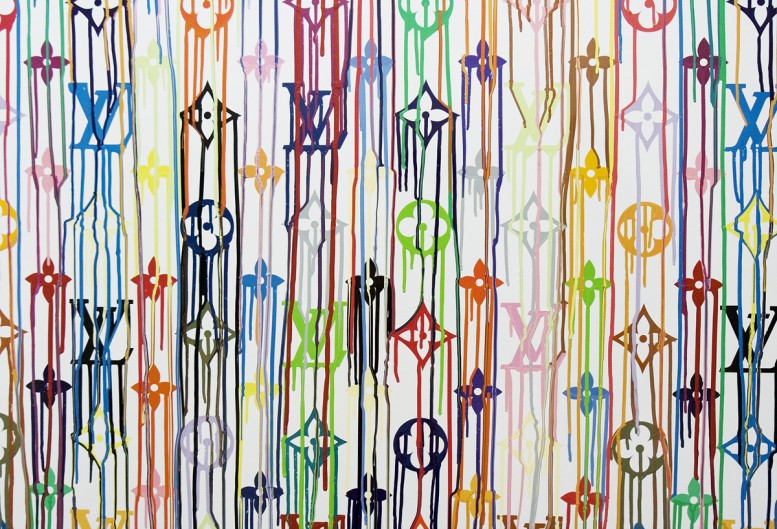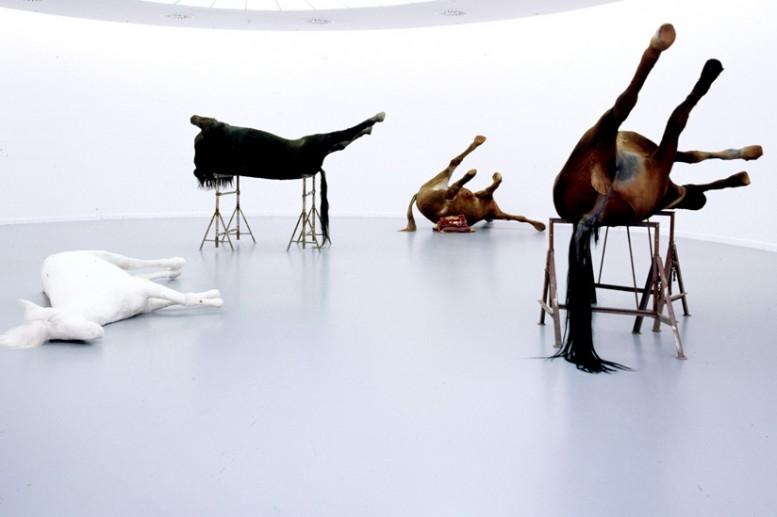
Appropriated Imagery: Richard Prince + Jackson Pollock

Guild Hall of East Hampton presents Richard Prince “Covering Pollock” featuring 27 new works that are focused on Jackson Pollock, a leader of the Abstract Expressionist group. Richard Prince uses appropriation to distill and disrupt America’s compulsive fascination with iconic brands, fame, and lifestyle. This is the first public viewing of “Covering Pollock” and the first museum exhibition of Richard Prince’s work on Long Island. On view until October 17.
[EXHIBITION] Frida Kahlo and Diego Rivera
Frida-White-Bench
The two most famous artists to have come from Mexico, the lives of Frida Kahlo and Diego Rivera have attained a mythological status. A major touring exhibition, which comes first to Chichester from Istanbul and Dublin, brings together works by Frida Kahlo and Diego Rivera for the first time ever in the UK. On view now until October 9 at the Pallant House Gallery in Chichester, U.K.
Pornography and Motherhood

Madison Young isn't your average pornstar – she's an artist, a feminist, and a sexual educator. Young, born Tina Butcher, caused uproar when she exhibited a show, entitled Becoming Milf, at her gallery Femina Potens Art Gallery, that explored her own new found motherhood, as well as the societal myths and stereotypes of motherhood. The above photograph caused such a controversy that some accused Young of pedophilia. "I’m brand new to motherhood. My little girl is only eight weeks old right now. I’m sure that sharing my life with my daughter will inspire, influence and affect my work in different ways as she gets older. Right now, as the mother of a newborn, one of my greatest challenges is time. I’ve always tried to balance more than is humanly possible in a day but now I have a tiny little being who needs and demands my attention 24/7. I’ve had to really prioritize what areas of my life I need to be giving my energy to right now. I’ll be working mostly local for at least Emma’s first year, and if I decide to take out of state or country gigs next year then it will be a family affair. I take Emma along with me whenever I can, such as to university speaking engagements and to the art gallery, and Daddy watches Emma during the more adult-oriented work experiences."
Reflections within a Jeff Koons Sculpture

Venice, Italy. Photography by Adarsha Benjamin
[Excerpt] An Interview with Bruce LaBruce

Bruce LaBruce is a filmmaker, an artist, and a pornographer, and underneath the blood soaked sheets and layers of half rotting flesh of the undead he is one of the greatest auteurs and romantics of the last few decades. I was able to ask Bruce a few questions and we talked about important topics such as his childhood in rural Canada, the alternative gay movement, sex in art, and a few of his current and upcoming projects, including his film L.A. Zombie Hardcore, a documentary on the artist himself entitled The Advocate for Fagdom by French filmmaker Angelique Bosio, and a short film involving two female to male transexuals which will premier at the Berlin Porn Festival this October.
You wrote a memoir called the reluctant pornographer – what does pornography mean to you? Well, lately I've been saying, which has sort of gotten me in trouble, because lately I've been calling myself a pornographer and saying I express solidarity with pornographers – that all pornography is art, really, because its a form of creative expression, its the mediation of reality, its made by people who use the tools of cinema, or making art, so why shouldn't it be considered art as well? There's good art and there's bad art and there's good pornography and there's bad pornography, but its all sort of an artistic expression as far as I'm concerned.
How important is sexuality in art or expressing sexuality through art? For me personally, sex has always been an engine behind my work, both in terms of representing and in terms of making it, on a personal level, but I think the sexual and the creative drives are very much linked, but on the other hand I know people who are relatively, or fairly, or completely a-sexual who have very strong artistic drives, so I don't think that's necessarily the case for everyone. Certainly with the gay movement was always based on that kind of sexual engine as well, which for me is yet another reason why, for me, the assimilation movement, which tends to be more domesticated and kind of based on ideals of monogamy borrowed from straight culture - it kind of dissipates the energy of the gay movement in my opinion. Yeah, sex is so ubiquitous in pop culture and advertising that its kind of hard to ignore it as an artist.
Do you think its more ubiquitous now than it has been? Well, I think that whats been happening in the last ten to fifteen years is that violence supplanted sex as the main driving force of popular fetish and popular advertising and certainly the media news sells violence and death in a very titillating kind of sexualized way - which is kind of creepy.
Full article and interview coming soon.....
Text by Oliver Maxwell Kupper for Pas Un Autre
GLEE Curated by Cecilia Alemani
Blum and Poe gallery in Los Angeles presents Glee, a group exhibition curated by Cecilia Alemani featuring Michele Abeles, Shannon Ebner, Sharon Hayes, Tobias Madison, Kaspar Müller, Virginia Overton, Joan Semmel, Andra Ursuta, Jakub Julian Ziolkowski. The exhibition Glee brings together artworks by nine artists from different generations, working in both America and Europe. Glee is an exhibition informed by a synthetic look; a show in which works appear coated in a shiny patina charged with a startling artificiality. Imbued in an atmosphere of joyful madness, the exhibition is agitated by a strange, at times erotic, tension. Simultaneously affected and sincere, superficial and deep, pop and rotten, the selected works share a blissful and seductive presence that can hide an incumbent sense of tragedy. Glee will be on view until August 27 at Blum and Poe.
Carlo Mollino: Un Messaggio dalla Camera Oscura
Born into a Turin architect and civil engineer’s family, Carlo Mollino studied art history and architecture and made a name for himself as a skier, racecar driver and aerobatic pilot, as an author and photo artist. Yet his international renown is primarily based on his work as a designer of furniture and exclusive interiors in the spirit of the gesamtkunstwerk – the German philosophy of total art. His organic language of forms was not least inspired by the form of the female body – as particularly evidenced by the part of his photographic work he always kept private: over 1,000 Polaroids portraying beauties of Turin’s night life in the nude in mise-en-scène settings. The pictures were part of the preparation of his “House for the warrior’s rest” (today: Casa Mollino), a villa in Turin on the Po River. An exhibition, opening at this month at the Kunsthalle Wien in Vienna, will juxtapose furnishings of the villa with a selection of these Polaroids for the first time. It explores the boundaries and bridges between this universal artist’s male erotic imagination and his intellectual and artistic attitude. On view at the Kunsthalle Wien from August 31 to September 25.
Cris Cleen Works
Short documentary on tattoo artist Cris Cleen by Andreas Tagger from Brothers By Choice.
[LONDON] Power of Making
 Left: Blond Lips, Charlie Le Mindu using Hairdreams. Image by Manu Valcarce - Right: Sandra Backlund knitted dress, © John Scarisbrick
Left: Blond Lips, Charlie Le Mindu using Hairdreams. Image by Manu Valcarce - Right: Sandra Backlund knitted dress, © John Scarisbrick
The Victoria and Albert Museum in London and Crafts Council celebrate the role of making in our lives by presenting an eclectic selection of over 100 exquisitely crafted objects, ranging from a life-size crochet bear to a ceramic eye patch, a fine metal flute to dry stone walling. Power of Making is a cabinet of curiosities showing works by both amateurs and leading makers from around the world to present a snapshot of making in our time. On view September 6 to January 2, 2012.
[FILM STILL] MY HUSTLER by Andy Warhol
Directed by Andy Warhol & Chuck Wein. With Paul America, Ed Hood, Joseph Campbell, Genevieve Charbon. In this early Warhol narrative, several men and women on Fire Island vie for the attention of a hustler. Featuring catty dialogue, a few long takes, and limited camera movement, the film appears artless at first but ultimately proves canny, casual, and affecting. On view tonight and Wednesday night the MoMA in New York as part of the Hot and Humid: Summer Films from the Archives series.
What Does Jesus Think of Lapdancing?
If you can believe it, she has read the bible a total of six times. Canadian born artist Charmaine Wheatley is as prolific as she exhibits her work, but lately its sex thats been on her mind. Her new series of erotic illustrations are a testament to her own path of discovery of sex outside the confines of her religious upbringing. Having been living in New York for a little over a decade, Charmaine Wheatley – with ample freedom and wells of creativity – has certainly found her artistic identity, but as for her sexual identity, its exploration is all there on the canvas, per se. Charmaine Wheatley's artwork is extremely multi-dimensional. Mediums integrate into mediums: from illustration, to performance art, to sculpture and back again. In her collaboration with DJ and sound artist Taketo Shimada, inspired by her namesake – her name comes from the widely recorded song and 1920s standard "Chaarmaine" – they are trying build and demonstrate the personality of CHARMAINE. And if this collaboration is an example, it is proof unto itself how multifaceted and adroit the sum of Charmaine Wheatley's artistic ambitions are. A description of this collaboration then makes total sense: "....a direct reference to fantasy, gift giving, sound art, contemporary feminist dialogue and pop culture while investigating issues of intimacy and sexual tension that dissolve any boundaries between sexual preference, cultural or class backgrounds, age or gender types." Pas Un Autre was lucky enough to ask Charmaine Wheatley a few pertinent questions, after the jump.
Charmaine_Wheatley_abbey_meaker
Why did you decide to move to New York City from Canada? When Halifax (Nova Scotia) started to feel too small. There was no where I could go without bumping into someone I knew. I liked the anonymity of NYC. If I want to bump into people I know, I go to Chelsea, the Lower Eastside/ West Village, Williamsburg, Dumbo, etc. If I want to make sure I don’t I just go uptown or the Financial District. Also I was trying to get away I realize now from an f’d up relationship and social situation. I didn’t feel much loyalty in my circle the way things were up there. Also I was dazzled by the possibilities of NYC. I didn’t want to see anymore rocks, trees, lakes, ocean... Of course the last part has changed. I need nature in my life.
How has living in the city impacted your work/direction?I can get whatever materials I want. I don’t have to just look in books to see an artwork I like. I just go see the piece in the museum or gallery. I’m visually stimulated on a daily basis. No one ever calls what I do, “strange” or “weird”. If I need to dress up like a tooth fairy in the middle of the day and walk down 5th Ave. people barely bat an eyelash. I mean, I haven’t had the need to explore that particular identity but I am aware of the freedom to if I need to....However walking around naked isn’t tolerated...even the naked cowboy and cowgirl aren’t naked. But that conservatism is something to challenge.
Can you remember the first thing you drew?Hmmm the very first thing? Really I can’t. I’m sure I did all the same kind of little kid drawings....I guess I remember the 1st drawing contest I won 1st prize in. Like in Grade 1 or 2. It was a 2-frame comic, color, on bristol board with crayons and markers. The Royal Bank sponsored the competition. The 1st frame was a boy on the bank of a lake, throwing a rock into the water. The second frame was a close up of the rock hitting the water and ripples emanating. My text was like: ‘Putting your money in the bank is like throwing a rock in the water. Your money gets bigger and bigger’ or something like that...Making reference to savings account and accruing interest on deposits. I don’t even think I was trying to suck up to the bank. I don’t think I understood that the bank chose the winners or whatever. I really honestly thought banks were great. I was a nerdy, earnest kid with a piggy bank and was really into saving money. There was a picture of me in the paper accepting the prize of my first bank account. They put a little money in it and gave me some pen. I was so very honored!
What are your inspirations?Basically I’m inspired by everything and everyone.
Can you tell us a little bit about the erotic series?My keen interest in all things sexual is pretty textbook actually. I’ll now admit I was raised in a strict and cloistered religion. I’ve read the bible 6 times. Premarital sex was a sin. I had to figure out how to sin on my own, without any clues from my parents and I wasn’t allowed to take Health class in school plus I was so busy with studying the bible and such that I had no time for making friends. Besides friends that weren’t part of our religion weren’t really to be trusted... “Bad associations spoil useful habits” (1 Corinthians 15:33). So of course I became acutely curious and wanted to learn first hand all about that which I knew nada. That interest only grows...
What are you working on now?I’ll mention these 3 things: 1. The above drawings are more recent and the propaganda tract is the first of a series I’m working on producing. The next one will be excellent! “What Is The Role Of Women?” I’ll paint a dazzling portrait of Babylon a.k.a. Mother of the Harlots for the front. There is some related performance activity that accompanies the tract. 2. Also I did a collaborative piece with a fellow artist who draws, Joan Linder for the publication “FUKT” that comes out of Berlin. It’ll be available at the upcoming NY Art Book Fair. 3. sex
www.charmainewheatley.com
Text by Abbey Meaker and Oliver Maxwell Kupper for Pas Un Autre
Blow Up
Love Forever
The New Hieroglyphic Language of Light and Time
 New Mexico, USA, 1975
New Mexico, USA, 1975
Ernst Haas was one of those rare photographers of the 20th century imbued with a certain poetical sensibility. Born in Vienna in 1921, Haas almost went into medicine, but his artistic inclinations led him to photography. Haas was soon invited into the famous Magnum photo agency, the first invitation by the agency's founder's Robert Capa, Henri Cartier-Bresson, George Rodger, and David Seymour. Haas, like William Eggleston, was one of the first adopters of color photography and is largely credited with changing the medium as an artform altogether. Ernst Haas was also profoundly prolific, traveling the world for assignments for magazines, but along the way he was building a personal portfolio of images the world has never seen – until now. Color Correction, a recently published monograph, exhibits a collection of never before seen photographs that are considered "far more edgy, loose, complex and ambiguous," and that Haas believed – in his own lifetime – people just wouldn't understand.
 New Mexico, USA, 1975
New Mexico, USA, 1975
On Photography: Philosophy by Haas
Photography is a bridge between science and art. It brings to science what it needs most, the artistic sense, and to art the proof that nothing can be imagined which cannot be matched in the counterpoints of nature. Through photography, both artist and scientist can find a common denominator in their search for the synthesis of modern vision in time, space and structure. We can write the chapters in a visual language whose prose and poetry will need no translation.
The camera only facilitates the taking. The photographer must do the giving in order to transform and transcend ordinary reality. The problem is to transform without deforming. He must gain intensity in form and content by bringing a subjective order into an objective chaos. Living in a time of the increasing struggle of the mechanization of man, photography has become another example of this paradoxical problem of how to humanize, how to overcome a machine on which we are thoroughly dependent....the camera....
In every arts there is poetry. In every human being there is the poetic element. We know, we feel, we believe. As knowers we are like the scientist relating through logical determination. As feelers, we are like poets relating the unrelated through intuition. As believers, we are only accepting our human limitations. The artist must express the summation of his feeling, knowing and believing through the unity of his life and work. One cannot photograph art. One can only live it in the unity of his vision, we well as in the breadth of his humanity, vitality, and understanding....
There is no formula – only man with his conscience speaking, writing, and singing in the new hieroglyphic language of light and time.
Text by Ernst Haas
Intro Text by Oliver Maxwell Kupper
Color Correction by Ernst Haas (Steidl)
 Route 66, Albuquerque, New Mexico
Route 66, Albuquerque, New Mexico
[LIQUIDATED] ZEVS Solo Show in Tokyo
zevs_losangeles_2
zevs_liquidated_logos_hong_kong_artist_statements
Venerable French street art mainstay ZEVS' first solo show will open in Tokyo at Art Statements Gallery this September 2 and will be on view until September 23. ZEVS twisted, dripping logos and corporate iconography is obvious statement unto itself and have become as recognizable as the logos themselves. 3-2-12 Ebisu-minami Shibuya-ku, Tokyo 150-0022, Japan
Berlinde De Bruyckere and John Currin in Montreal
left: John Currin, Deauville right: John Currin, The Dane
DHC/ART in Montreal presents two concurrent solo exhibitions by acclaimed Belgian sculptor Berlinde De Bruyckere and American painter John Currin - "two leading international figurative artists working in a virtuosic, old masterly tradition yet testing and expanding the parameters of their respective disciplines." On view until November 13. www.dhc-art.org
A Scattering of Blossoms & Other Things
The Museum of Contemporary Art presents Cy Twombly Tribute: A Scattering of Blossoms & Other Things, a memorial exhibition of the late painter Cy Twombly on view at MOCA Grand Avenue through October 2, 2011.
Dalí: Mind of a Genius
 The aphrodisiac telephone by Salvador Dali
The aphrodisiac telephone by Salvador Dali
SINGAPORE: Explore over 250 artworks which highlight the creativeness of Dalí across different mediums, including bronze sculptures, rare graphics, furniture, gold jewelry and crystal pieces in three themed areas – Femininity and Sensuality, Religion and Mythology, Dreams and Fantasy. Highlights include Dance of Time I (Dalí's famous representation of melted clocks), Woman Aflame (sculpture uniting two of Dalí's obsessions - drawers and fire), Spellbound (a huge painting featured in Alfred Hitchcock's movie of the same name) and the Mae West Lips Sofa (inspired by actress Mae West's sensual lips). Now on view at the Marina Bay Sands in Singapore until October 11.
Ingrid Calame at the Edinburg Art Festival

















